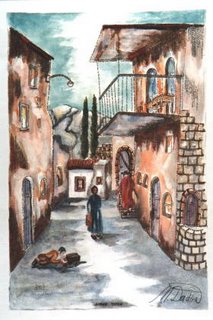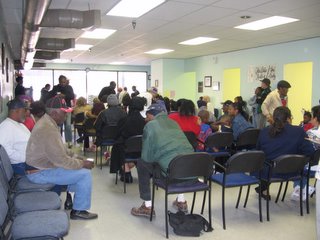The
U. S. House of Representatives will begin debate today on next year's federal budget.
Advance work indicates that the House will find
$54 billion in cuts over the next decade.
On the chopping block:
- Medicaid--the health insurance for the poorest of our fellow citizens--cuts of $9.5 billion, including a new co-pay requirement for pregnant women and children
- Child protective services--$8 billion in foster care, child support enforcement, and aid to disabled children
- Food Stamps Program--$844 million that would turn away 300,000 people
- Reduced-price school lunches--40,000 children cut annually
- Taxes for the top 3% of taxpayers--$70 billion primarily for the benefit the wealthiest Americans
As my friend, Jim Wallis, founder of Sojourners magazine and Call to Renewal, says,
"The message from Congress is that in response to Hurricane Katrina, we're going to cut services for the poor, cut taxes for the rich, and increase deficits for our children and grandchildren.
"These plans for deep cuts to social supports, paid for by tax cuts for the wealthiest, are contrary to the national priorities we need to protect our most vulnerable citizens. We need strong moral leadership in Congress, especially during this time of war, record deficits, rising poverty and hunger, and natural disasters.
"Cutting food stamps and health care that meet the basic needs of poor families is an outrage. Cutting social services to pay for further tax cuts for the rich is a moral travesty that violates biblical priorities. The House leadership seems to be saying they literally want to take food from the mouths of children to make rich people richer.
"If this ideology and politics of rich over poor prevails and our leaders fail to govern from a set of moral values, then the religious community must conclude that compassionate conservatism is dead.
"As this battle for the budget unfolds, I am calling on members of Congress, some of whom make much out of their faith, to start Bible studies before they cast votes to cut services that will further harm the weakest in our nation. They should focus on the gospel imperative - what Jesus tells us about our obligations to the 'least of these.'
"Some of them have heard the slogan 'What would Jesus do?' Now they should ask, 'What would Jesus cut?' Budgets are moral documents, and they reflect our national priorities and values.
"In the name of social conscience, fiscal responsibility, equal opportunity, protecting our communities, and the very idea of a common good, the upcoming budget votes will be closely watched by people of faith."
Why cut services that help create opportunity and hope for the weakest among us?
Maybe it is a matter of voice or the lack thereof.
Yesterday I heard an interview involving a physician who provided care for poor patients who had Medicaid benefits. He made a telling comment when he said, "The government continues to cut funds for Medicaid knowing that many of us will continue to care for the poor, even though our costs are not covered by the reimbursements provided. This will not continue. The poor will only suffer more."
Later, when I arrived at my office, I was greeted by a gentleman with a terrible tooth ache.
His name was Russell.
He had been standing in line at a low-income emergency dental clinic since before 6:00 a.m. only to be told that he would need $60 to receive the service he needed.
He had no money.
He received no relief.
By the time he arrived at CDM, he was at the end of his rope to say the least. Angry, frustrated, and in real pain, he was in no mood for "logical explanations." He lives on our streets and he needed compassion, intervention and simple help.
While we were able to help him quickly, there are hundreds more just like him we cannot help. And public funds continue to disappear.
Wallis is correct: these are moral matters, plain and simple.
Contact your Congress person today and express your opinion.
"Speak up for those who cannot speak for themselves, for the rights of all who are destitute. Speak up and judge fairly; defend the rights of the poor and needy." (Proverbs 31:8-9)





